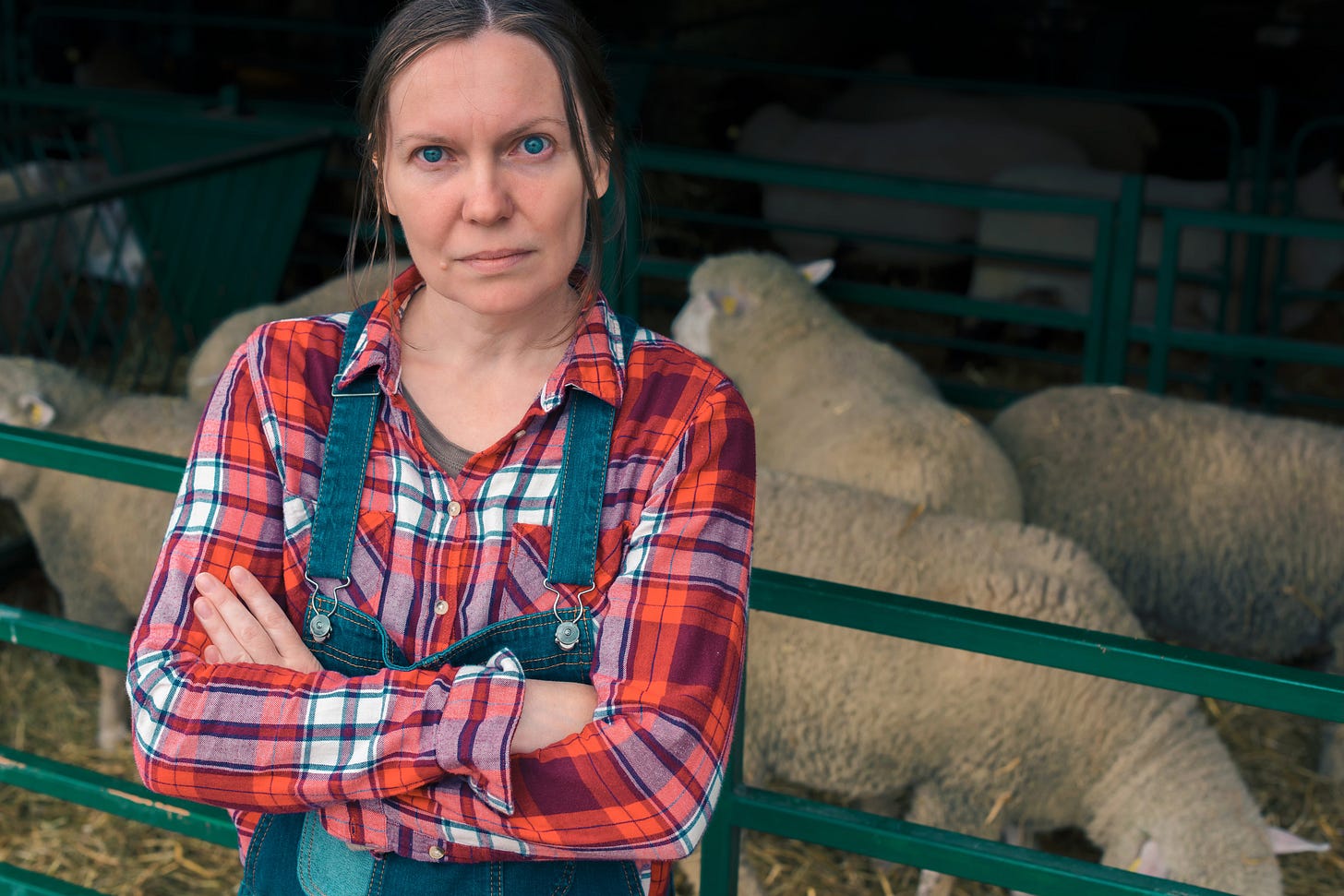A Quiet War on Farmers: The Disturbing Rise of Livestock Killings and Agricultural Sabotage
As rural communities face mounting pressure, a wave of targeted attacks—from poisoned water to slashed hay bales—reveals a hidden struggle threatening the future of family farms across America.
Across rural America, a disturbing trend is taking root — and it’s not drought, inflation, or policy overreach this time. It’s direct, violent, and deeply personal. Farmers are being attacked not by economic forces or environmental changes, but by individuals intent on sabotaging their work, threatening their livelihoods, and destroying their property.
In recent months, a disturbing pattern of targeted attacks on agricultural operations has emerged across the United States, raising concerns about the safety and security of farmers and their livelihoods. From Kansas to Pennsylvania and Virginia, incidents involving the deliberate killing of livestock and the poisoning of bee colonies have left communities shaken and authorities searching for answers.
Kansas Deer Farm Under Siege
In Burlington, Kansas, Danny and Laura Hawkins, owners of OZsome Big Game Hunts, have been grappling with a series of unexplained deer deaths on their property. Over the past six years, approximately 60 white-tailed deer—ranging from does to bucks and fawns—have been found shot dead. The Hawkinses, who have operated their deer farm for a decade, initially established the business out of a passion for white-tailed deer and a desire to educate others about the species. Despite reporting the incidents to local law enforcement and requesting assistance from the Kansas Bureau of Investigation, no suspects have been identified, and the shootings continue.
In many parts of the country, white-tailed deer are legally raised as livestock, much like bison, elk, or cattle. Farms like the Hawkins' provide a sustainable source of venison, educate the public about native species, and offer controlled hunting experiences.
While the ethics of game farms can spark debate, there is no justification for entering someone’s private land and executing animals en masse. This isn’t protest — it’s domestic terrorism.
The repeated attacks have not only resulted in significant financial losses but have also instilled fear and uncertainty within the farming community. The Hawkinses are offering a $7,000 reward for information leading to the arrest of those responsible.FXBG Advance
These were not wild animals. They were farm-raised livestock — white-tailed deer cultivated for hunting and meat production, providing both food and education about native species.
Let’s be clear: this is not hunting. This is not activism. This is targeted destruction.
Video: Over the past six years, more than 60 deer have been illegally shot on the Hawkins family’s Ozome Big Game Hunts property in Burlington, Kansas, yet the Kansas Bureau of Investigation has declined to open a case due to a lack of leads—despite a $7,000 reward being offered. The Hawkins believe the repeated attacks are the work of an unstable local individual deliberately targeting their operation, which was founded a decade ago to promote wildlife education and appreciation for whitetail deer. While communication with local law enforcement remains steady, the lack of investigative action underscores broader concerns: if such crimes continue unaddressed, they could set a dangerous precedent for similar acts against farmers and ranchers nationwide. The family is urging authorities to treat this escalating wildlife crime as a serious threat to both conservation efforts and agricultural livelihoods.
Livestock Shootings in Pennsylvania
In Lancaster County, Pennsylvania, a series of coordinated shootings has targeted multiple farms, resulting in the deaths of several cows and injuries to horses (Fox 29 Philadelphia). On March 15, 2025, state police reported that unknown individuals shot and killed cows in Colerain Township and then proceeded to Sadsbury Township, where they shot another cow and a horse. The horse survived, but the cow succumbed to its injuries. Authorities believe these incidents are connected and are actively investigating (WGAL News).
The attacks have had devastating economic impacts on the affected farmers, with each dairy cow representing not only immediate financial value but also future production potential. In response, the local community has rallied to support the victims, launching fundraisers to help cover veterinary bills and replace lost livestock. (The Bullvine)
Video: A series of coordinated shootings on dairy farms in Lancaster County has inflicted severe economic damage, with each cow lost representing nearly $1 million in future milk production, in addition to a $22,500 purchase cost. These acts are being recognized as agricultural terrorism—a rising threat to farmers and the nation’s food security. In response, authorities urge farmers to enhance on-farm security with cameras and surveillance systems. The Pennsylvania State Police are actively seeking public help to identify the culprits. This disturbing trend echoes past incidents of agricultural sabotage, such as arson in Oregon and vandalism in Vermont, underscoring how vulnerable rural communities remain to calculated violence targeting food producers.
Bee Colonies Poisoned in Virginia
In Stafford County, Virginia, beekeeper Jerry Mattiaccio discovered a horrifying scene at his Rock Hill Honey Bee Farm: over half a million bees from 52 colonies were found dead, suspected to have been poisoned deliberately (Washington Post). The perpetrator had also padlocked the farm's gate, indicating premeditation. The loss amounts to an estimated $20,000 in damages.
Mattiaccio, a U.S. Army veteran, reported the incident to local authorities, who are conducting an ongoing investigation.The community has shown overwhelming support, with local businesses and individuals contributing to a reward fund that has grown to $7,500 for information leading to an arrest. (The Washington Post)
Video: At Rock Hill Honeybee Farm, between 480,000 and 500,000 bees were deliberately poisoned in an act of agricultural sabotage, part of a growing trend of “agterrorism” targeting food producers. The attackers locked the beekeeper out by chaining the gate, causing a $20,000 loss and contributing to a wider 70–80% drop in honeybee populations this year—threatening the pollination of a significant portion of U.S. crops. With a $7,500 reward now offered for information, this incident underscores the vulnerability of vital agricultural operations and echoes other recent crimes, such as livestock shootings in Pennsylvania, pointing to a troubling pattern of deliberate attacks on the nation’s food supply chain.
Sabotaged in Vermont: Young Farmers Face Devastating Attack on Livelihood
In yet another troubling case of agricultural sabotage, Ethan and Alexis Lawrence of Lawrence Family Farm in Vermont returned from a short vacation to discover their hay harvest—a lifeline for their cattle—had been deliberately destroyed. Someone had used a razor blade to slice open 51 out of 58 tightly wrapped round bales of high-quality second-cut hay, rendering them moldy and unusable. The cuts were strategically placed on the bottom of each bale and hidden by leftover mower trimmings, indicating this was not random vandalism but a calculated and informed attack.
The financial toll of this assault reached an estimated $7,500 when factoring in fertilizer, fuel, wrap, and labor, not to mention the emotional devastation. Ethan described the moment he discovered the damage as one of the lowest points in his farming life, saying, "I would have rather someone smashed my windows or slashed my tires."
The couple believes the crime was motivated by competition and resentment, possibly carried out by paid transients. While one individual involved has reportedly come forward in pursuit of reward money, the mastermind behind the attack remains unknown. With winters in Vermont requiring hundreds of hay bales to feed their growing herd, the loss equates to over two months of feed—putting their animals and business in jeopardy.
Despite the hardship, the Lawrences remained resilient, donating what little salvageable hay they had to nearby struggling farmers. Their story highlights the disturbing rise of targeted attacks on agricultural producers and underscores the urgent need for law enforcement to take rural crime seriously. It also demonstrates the strength of the farming community and the importance of public support for local food systems. The Lawrences' request is simple: "Stop by our farm. Try our burger. Support your local farmers."
Video: Ethan and Alexis Lawrence of Lawrence Family Farm in Vermont suffered a devastating act of sabotage when 58 of their hay bales—intentionally slashed with razor blades—were rendered useless, causing over $7,500 in losses and eliminating 85 days of essential winter feed for their livestock. The precise cuts suggest someone with specific agricultural knowledge deliberately targeted their operation, adding a deeply emotional toll to the financial damage. This incident reflects broader challenges facing small farmers, including limited access to USDA-inspected slaughterhouses, economic vulnerability, and pressures from corporate consolidation. Despite these hardships, the Lawrences demonstrated remarkable resilience by donating the ruined hay to fellow farmers in need. Their transparency and community-focused approach have helped build a loyal customer base, though regulations and market constraints still complicate efforts to innovate, such as selling organ meats. The episode underscores the critical importance of supporting local agriculture—not just in economic terms, but in preserving the integrity and future of rural food systems.
A Troubling Trend
These incidents are not isolated. Across the country, there have been reports of livestock thefts, shootings, and other acts of sabotage against agricultural operations. Such attacks not only threaten the livelihoods of individual farmers but also pose risks to the broader food supply chain and rural economies.
The motivations behind these crimes remain unclear, but the deliberate nature of the acts suggests a level of malice and intent that is deeply concerning. Whether driven by personal vendettas, ideological beliefs, or other factors, the impact on the victims and their communities is profound.
The agricultural community and law enforcement agencies must work collaboratively to address this alarming trend.Enhanced security measures, increased surveillance, and community vigilance are essential steps in protecting farms and deterring future attacks.Bullvine
Anyone with information about these incidents is urged to contact local authorities. In Kansas, tips can be directed to the Coffey County Sheriff's Office. In Pennsylvania, individuals should reach out to the Pennsylvania State Police Lancaster Station (Fox 29 News). In Virginia, the Stafford County Sheriff's Office is handling the investigation into the bee poisoning.
The safety and security of our nation's farmers are paramount. By standing together and remaining vigilant, we can help ensure that those who dedicate their lives to feeding our communities are protected and supported.
Defending the Right to Farm
At Meet My Neighbor Productions, we don’t just document these issues — we respond to them. From providing relief to flood-impacted farmers to filming eye-opening documentaries, we’re reconnecting communities with the farms that feed them.
Watch our work on YouTube: Yanasa TV
Get the Defend the Right to Farm hat: YanasaTrading.com




